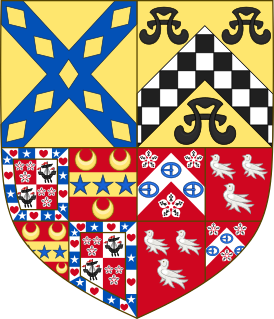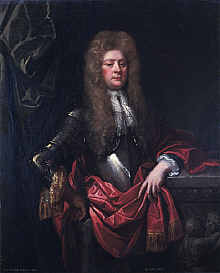| Look up stair or stars in Wiktionary, the free dictionary. |
A stair is part of a flight of steps.
Contents
Stair may also refer to:
| Look up stair or stars in Wiktionary, the free dictionary. |
A stair is part of a flight of steps.
Stair may also refer to:

Stair is a village in Cumbria, England. It is situated in the Newlands Valley, to the west of Derwent Water and within the Lake District National Park. It is some 4 miles (6.4 km) by road from Keswick.

Stair is a village in Ayrshire, Scotland. It lies at the bottom of a glen beside the River Ayr at the north-west border of the 5,376 acre Parish of Stair where the River Ayr is joined by the Glenstang Burn.

In the early hours on the morning of June 8, 2017, employees at a Weis Markets supermarket in Eaton Township, Pennsylvania, were stocking and closing the store for the night. Shortly before 1:00 a.m., 24-year-old Randy Stair barricaded the exits of the store and proceeded to shoot and kill three of his co-workers before shooting himself.

Sir Stair Agnew was a Scottish public official. He served as Registrar General for Scotland.

James Dalrymple, 1st Viscount Stair, Scottish lawyer and statesman, was born at Drummurchie, Barr, Ayrshire.
The Stair Society is a learned society devoted to the study of Scots law. It was instituted in 1934 "to encourage the study and to advance the knowledge of the history of Scots Law," and is named for James Dalrymple, 1st Viscount of Stair, the seventeenth century Lord President of the Court of Session considered the most important of Scots Law's Institutional Writers. It is comparable to the Selden Society, an organisation devoted to the study of English legal history.
Stairs are a set of steps.
House of Stairs is a lithograph print by the Dutch artist M. C. Escher, and it also may refer to:
Staircase can refer to the following:
| This disambiguation page lists articles associated with the title Stair. If an internal link led you here, you may wish to change the link to point directly to the intended article. |

Field Marshal John Dalrymple, 2nd Earl of Stair was a Scottish soldier and diplomat. He served in the Nine Years' War and the War of the Spanish Succession and, after a period as British Ambassador in Paris, became a military commander at the Battle of Dettingen during the War of the Austrian Succession.

Earl of Dumfries is a title in the Peerage of Scotland. It was originally created for William Crichton, 9th Lord Crichton of Sanquhar, in 1633, and stayed in the Crichton family until the death of the fourth countess in 1742, at which point the title passed to first the Dalrymple and then the McDouall families before finally being inherited by the Marquesses of Bute, where it remains today.

Earl of Stair is a title in the Peerage of Scotland. It was created in 1703 for the lawyer and statesman John Dalrymple, 2nd Viscount of Stair.

John Dalrymple, 1st Earl of Stair was a Scottish politician and lawyer. As Joint Secretary of State in Scotland 1691-1695, he played a key role in suppressing the 1689-1692 Jacobite Rising and was forced to resign in 1695 for his part in the Massacre of Glencoe. Restored to favour under Queen Anne in 1702 and made Earl of Stair in 1703, he was closely involved in negotiations over the 1707 Acts of Union that created the Kingdom of Great Britain but died on 8 January 1707, several months before the Act became law.
John Dalrymple may refer to:

John James Hamilton Dalrymple, 12th Earl of Stair,, styled Viscount Dalrymple between 1903 and 1914, was a Scottish soldier and Conservative Party, later Unionist Party, politician.

Sir Hew Dalrymple, Lord North Berwick (1652–1737) was a Scottish judge and politician.

John Hamilton Dalrymple, 10th Earl of Stair KT, styled Viscount Dalrymple from 1853 until 1864, was a Scottish peer and politician, who served as Governor of the Bank of Scotland for thirty-three years.
There have been several baronetcies created for people with the surname Dalrymple.
Dalrymple is a surname, originating with the toponym of Dalrymple, East Ayrshire, Scotland. Used as a surname denoting origin since the 16th century, it was carried by the viscounts of Stair, East Ayrshire in the 17th century . It also occurs as a commoners' surname since at least the 18th century. It has rarely been used as a given name since the later 18th century.
The Dalrymple, later Dalrymple-Hamilton, later Hamilton-Dalrymple Baronetcy, of North Berwick in the County of Haddington, is a title in the Baronetage of Nova Scotia. It was created on 29 April 1697 for the Hon. Hew Dalrymple, Lord President of the Court of Session under the judicial title of Lord North Berwick from 1698 to 1737. He was the third son of James Dalrymple, 1st Viscount of Stair, and the brother of John Dalrymple, 1st Earl of Stair, Sir James Dalrymple, 1st Baronet, of Cranstoun, and Sir David Dalrymple, 1st Baronet, of Hailes. The second Baronet sat as Member of Parliament for Haddington and Haddingtonshire. The third Baronet represented Haddingtonshire in the House of Commons. The fourth Baronet was Member of Parliament for Haddingtonshire, Ayrshire and Haddington. He assumed the additional surname of Hamilton after that of Dalrymple. The fifth Baronet sat as Member of Parliament for Haddington. The eighth Baronet assumed the surname of Hamilton before that of Dalrymple. The tenth Baronet was Lord-Lieutenant of East Lothian from 1987 to 2001.
Events from the year 1691 in the Kingdom of Scotland.
Events from the year 1695 in the Kingdom of Scotland.
General John Hamilton Dalrymple, 8th Earl of Stair KT, known as Sir John Dalrymple, 5th Baronet, between 1810 and 1840, was a British soldier and politician.

Oxenfoord Castle is a country house in Midlothian, Scotland. It is located 1 kilometre (0.62 mi) north of Pathhead, Midlothian, and 6 kilometres (3.7 mi) south-east of Dalkeith, above the Tyne Water. Originally a 16th-century tower house, the present castle is largely the result of major rebuilding in 1782, to designs by the architect Robert Adam. Oxenfoord was the seat of the Earl of Stair from 1840, and remains in private ownership. It is protected as a category A listed building, while the grounds are included in the Inventory of Gardens and Designed Landscapes in Scotland.
John Dalrymple, 5th Earl of Stair (1720–1789) was a Scottish soldier and politician.